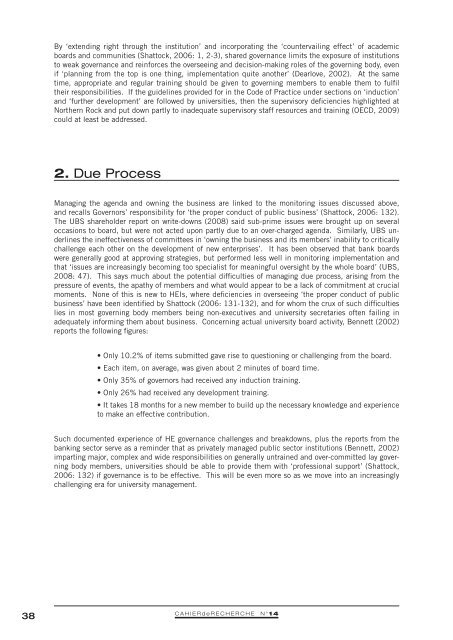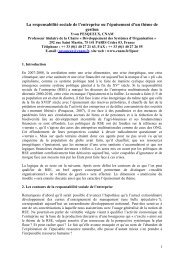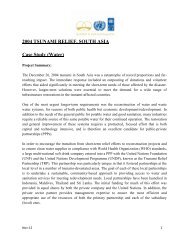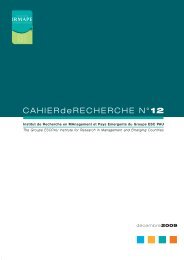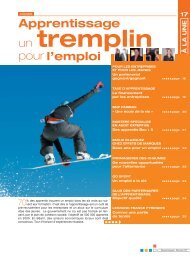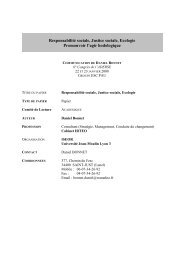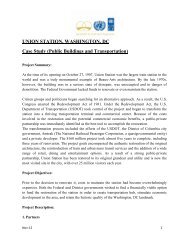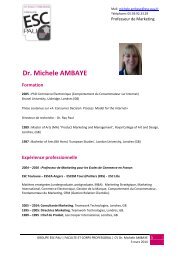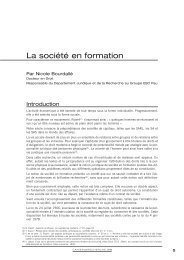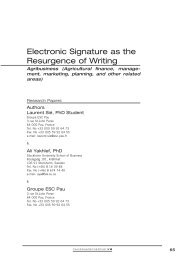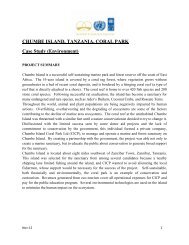Cahier de recherche N°14 - ESC Pau
Cahier de recherche N°14 - ESC Pau
Cahier de recherche N°14 - ESC Pau
Create successful ePaper yourself
Turn your PDF publications into a flip-book with our unique Google optimized e-Paper software.
By ‘extending right through the institution’ and incorporating the ‘countervailing effect’ of aca<strong>de</strong>micboards and communities (Shattock, 2006: 1, 2-3), shared governance limits the exposure of institutionsto weak governance and reinforces the overseeing and <strong>de</strong>cision-making roles of the governing body, evenif ‘planning from the top is one thing, implementation quite another’ (Dearlove, 2002). At the sametime, appropriate and regular training should be given to governing members to enable them to fulfiltheir responsibilities. If the gui<strong>de</strong>lines provi<strong>de</strong>d for in the Co<strong>de</strong> of Practice un<strong>de</strong>r sections on ‘induction’and ‘further <strong>de</strong>velopment’ are followed by universities, then the supervisory <strong>de</strong>ficiencies highlighted atNorthern Rock and put down partly to ina<strong>de</strong>quate supervisory staff resources and training (OECD, 2009)could at least be addressed.2. Due ProcessManaging the agenda and owning the business are linked to the monitoring issues discussed above,and recalls Governors’ responsibility for ‘the proper conduct of public business’ (Shattock, 2006: 132).The UBS sharehol<strong>de</strong>r report on write-downs (2008) said sub-prime issues were brought up on severaloccasions to board, but were not acted upon partly due to an over-charged agenda. Similarly, UBS un<strong>de</strong>rlinesthe ineffectiveness of committees in ‘owning the business and its members’ inability to criticallychallenge each other on the <strong>de</strong>velopment of new enterprises’. It has been observed that bank boardswere generally good at approving strategies, but performed less well in monitoring implementation andthat ‘issues are increasingly becoming too specialist for meaningful oversight by the whole board’ (UBS,2008: 47). This says much about the potential difficulties of managing due process, arising from thepressure of events, the apathy of members and what would appear to be a lack of commitment at crucialmoments. None of this is new to HEIs, where <strong>de</strong>ficiencies in overseeing ‘the proper conduct of publicbusiness’ have been i<strong>de</strong>ntified by Shattock (2006: 131-132), and for whom the crux of such difficultieslies in most governing body members being non-executives and university secretaries often failing ina<strong>de</strong>quately informing them about business. Concerning actual university board activity, Bennett (2002)reports the following figures:• Only 10.2% of items submitted gave rise to questioning or challenging from the board.• Each item, on average, was given about 2 minutes of board time.• Only 35% of governors had received any induction training.• Only 26% had received any <strong>de</strong>velopment training.• It takes 18 months for a new member to build up the necessary knowledge and experienceto make an effective contribution.Such documented experience of HE governance challenges and breakdowns, plus the reports from thebanking sector serve as a remin<strong>de</strong>r that as privately managed public sector institutions (Bennett, 2002)imparting major, complex and wi<strong>de</strong> responsibilities on generally untrained and over-committed lay governingbody members, universities should be able to provi<strong>de</strong> them with ‘professional support’ (Shattock,2006: 132) if governance is to be effective. This will be even more so as we move into an increasinglychallenging era for university management.38CAHIER<strong>de</strong>RECHERCHE N°14


